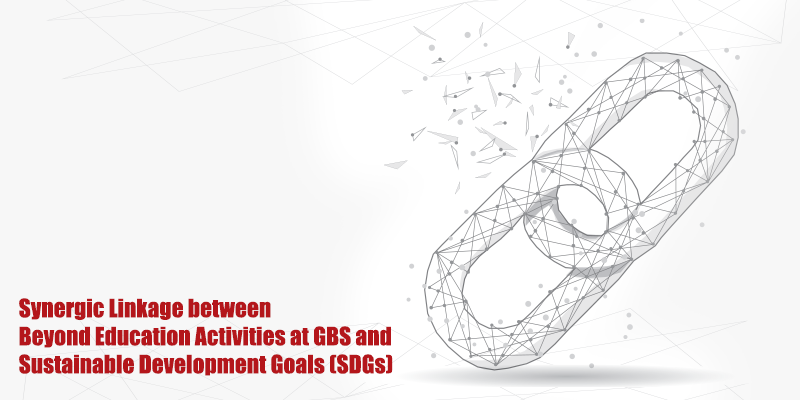Editor’s Note
Dr. Tanusree Chakraborty teaches Economics and Statistics at Globsyn Business School – top B Schools in Kolkata. Dr. Chakraborty has completed her Masters and Ph.D. in Economics from the esteemed Calcutta University. With over 15 years of experience in teaching and research, she has led several learning sessions for aspirants, in the field of Economics, Operations Research, Research Methodology, Statistics and Gender & Development. Dr. Chakraborty’s repertoire of work includes a number of published books and journals, wherein she has extensively contributed her knowledge about women’s economic empowerment in the present day. She has also been actively involved in events, seminars and conference proceedings of international repute.
Effective and optimal participation of the management students in the socio-economic activities beside their regular classroom activities is pivotal for an inclusive and sustainable development and yet, irrespective of their number in the population, they remain an underused resource. There may be some confounding factors that both enhance the growth of and constricted the important link between sustainable development and role of management institution. By using instrumental variable analysis, we may address these challenges. But a believable mechanism to search the relationship would require finding a variable that underwrites to growth only through its effect on society beyond closed door studies, which itself is a challenging issue. It has become widely understood that promoting beyond classroom activities through experiential learning is an essential component of an effective economic and human development strategy.
According to UNDP report the Sustainable Development Goals (SDGs), were adopted by the United Nations in 2015 as a worldwide appeal to feat to end poverty, protect the Earth, and ensure that by 2030 all people enjoy peace and prosperity.
The 17 SDGs are amalgamated in such a way that action in one domain will impact the deliverables in others, and this developmental approach creates the pathway towards economic, social and environmental sustainability.
SDGs embolden schools and colleges to go beyond classroom and adopt interactive, real-life based learning techniques which help to make education more meaningful and connected to the world.
Adopting SDGs helps academic institutions contour a healthier world by preparing students to become creative, ground-breaking, and sensitive leaders of tomorrow.
Linking Sustainable Development Goals with beyond classroom activities along with classroom awareness generating pedagogy in management institutions is a powerful way to promote awareness, leadership, and social responsibility among students that paved the pathways towards sustainable and ethical environment.
Globsyn Business School relies on ‘Learning Beyond Education’. It has many innovative components like Globsyn Management Conference, Globsyn Alumni Engage, Embryon, Kalyani Youth Leadership Forum and Serendipity through which we spread the concept of ‘Beyond Education’ among our stakeholders. All activities are accomplished by GBS students. These best practices are framed to impact every important stakeholders of the school – students, alumni, academicians.
Globsyn Business School persuades students to use their theoretical know-how, thoughts and critical thinking in formulating practicable business plans during their course of study. ‘Embryon’ – the entrepreneurship cell of Globsyn Business School, nurtures these ideas and offers students the stands to display their business plans to an independent expert panel comprising of industry troupers, whose inputs help silhouette the ideas into successful endeavours. ‘Embryon’ – the entrepreneurship cell of Globsyn Business School can support SDG 8 (Decent Work and Economic Growth) by encouraging start-up ideas that solve social/environmental problems.
Kalyani Youth Leadership Forum (KYLF) of Globsyn Business School help the students to inculcate the practice of selfless social work as an integral part of their lives, while co-opting humane skills necessary to become sensible and practical corporate managers. The ‘Care for Society’ initiative provides an opportunity to students to contribute towards the upward mobility of society as well as develop themselves as dedicated, ethical & empathetic managers and better human beings.
KYLF primarily works in the following verticals, namely:
- Elderly Care
- Differently-abled Care
- Channelizing Youth
Throughout the year, the students of GBS through KYLF outspread themselves towards building equality in society and bringing a new social order by organizing events which are addressing different sustainable goals.
- Blood Donation Camp & Cancer Awareness (SDG 3 – Good Health)
- Eye Screening Camp for underprivileged children (SDG 3 – Good Health; SDG 10 – Inclusivity)
- ‘Herbal Holi’ for the cancer-stricken children at a Child Care Centre (SDG 10 – Inclusivity)
- Fun-filled activities for the differently abled residents of Bodhayan, along with their family members (SDG 10 – Inclusivity)
- ‘Joy of Giving’ and ‘Lighting Up Smiles’ for the Globsyn Support Staff, as well as for the under privileged sections of the society (SDG 2 – Zero Hunger; SDG – 10 Inclusivity)
- Celebrating the spirit of summer and spreading unadulterated joy among the street children through ‘Mango Festival’, amongst others (SDG 2 – Zero Hunger; SDG 10 – Inclusivity)
- Sports tournaments, and mental wellness for students and employees (SDG 3 – Promotion of Health and Well-being)
- ‘Serendipity’ – a platform where entrepreneurs and intrapreneurs were developed and groomed and the students get an advantage to be identified as ‘leader’’ in the competitive corporate environment with innovative mind and ethical root (SDG 9 – Innovation; SDG 16 – Ethical Leadership)
Under the banner of Globsyn Management Conference, we have held nine successful seminars so far, since 2017. The themes of the Vision Seminars held so far were as follows:
- Spirituality in Management Education
- Women Empowerment
- Corporate Ethics and Responsible Leadership
- Technology in Management in the Age of Industry 4.0
- Sustainability in the Age of Disruption
- ESG to SDG – the Roadmap for a Sustainable World
- Innovation and Entrepreneurship in Management Education
- Embracing AI for humanity
- Ethics, AI, and Human Values: Pioneering Management Education for a Sustainable Future
Globsyn Business School has been organising Research Seminar to give the opportunity to the students to get exposure to the corporate world, promote research, provide a forum for exchanging ideas on cutting edge breakthroughs in management practices. At Globsyn Business School we follow this strategy of holistic development of a student. Research opportunity in Globsyn Business School paves the way to explore how this may contribute to enhancing the field of management development thinking and practice. According to the culture of Globsyn Business School, research will help management students realize their true potential and generate long-term tangible and intangible benefits.
All the themes have addressed the SDG 4 – Quality Education; SDG 2 – Zero Hunger; SDG 5 – Gender Equality; SDG 10 – Inclusivity, Sustainable Cities and Communities; SDG 16 – Ethical Leadership; SDG 8 – Decent Work and Economic Growth; SDG 9 – Industry, Innovation, and Infrastructure; and SDG 2 – Reduced Inequality.
Beyond Education vertical along with regular classroom activities genuinely believes in the linkage between SDGs and management education which in reality enhances practical learning beyond the classroom, builds socially responsible leaders, aligns students with global development priorities and encourages collaboration, innovation, and empathy.

Dr. Tanusree Chakraborty
Faculty – Economics and Statistics
Globsyn Business School


